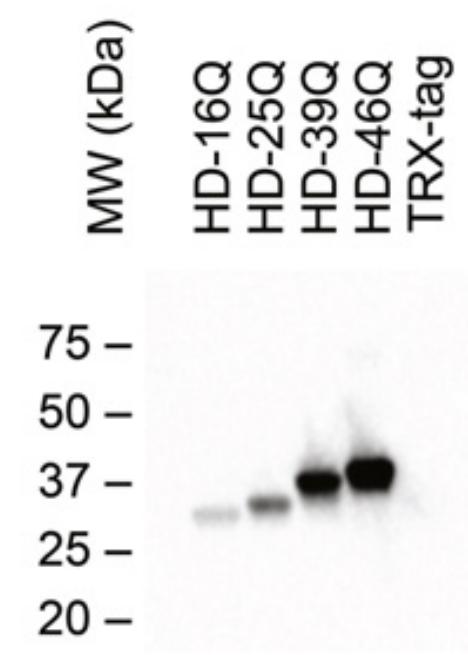Anticorps Monoclonal anti-Polyglutamine
Polyglutamine Monoclonal Antibody for WB
Hôte / Isotype
Mouse / IgG2b, kappa
Réactivité testée
Applications
WB
Conjugaison
Non conjugué
CloneNo.
MW1
N° de cat : 65239-1-Ig
Synonymes
Galerie de données de validation
Applications testées
| Résultats positifs en WB | Protéine recombinante |
Dilution recommandée
| Application | Dilution |
|---|---|
| Western Blot (WB) | WB : |
| It is recommended that this reagent should be titrated in each testing system to obtain optimal results. | |
| Sample-dependent, check data in validation data gallery | |
Informations sur le produit
65239-1-Ig cible Polyglutamine dans les applications de WB et montre une réactivité avec des échantillons
| Réactivité | |
| Hôte / Isotype | Mouse / IgG2b, kappa |
| Clonalité | Monoclonal |
| Type | Anticorps |
| Immunogène | Protéine recombinante |
| Nom complet | Polyglutamine |
| Numéro d’acquisition GenBank | N/A |
| Symbole du gène | |
| Identification du gène (NCBI) | |
| Conjugaison | Non conjugué |
| Forme | Liquide |
| Méthode de purification | N/A |
| Tampon de stockage | PBS with 0.09% sodium azide. |
| Conditions de stockage | Store at 2-8°C. Stable for one year after shipment. 20ul contiennent 0,1% de BSA. |
Informations générales
Huntington's disease is a neurodegenerative disorder caused by the expansion of a polyglutamine (polyQ) repeat in the N-terminal portion of huntingtin protein to a length above 35-40 units (PMID: 26047735; 19507258). The mutational expansion of polyglutamine above a critical length causes a toxic gain of function in huntingtin and results in neuronal death. In the course of the disease, expanded huntingtin is proteolyzed, becomes abnormally folded, and accumulates in oligomers, fibrils, and microscopic inclusions (PMID: 25336039). The anti-polyglutamine (polyQ) antibody MW1 specifically binds the polyQ domain of huntingtin exon 1. On western blot, the MW1 clone strongly prefers to bind to the expanded polyQ repeat form of Htt, displaying no detectable binding to normal huntingtin (PMID: 11719267).


